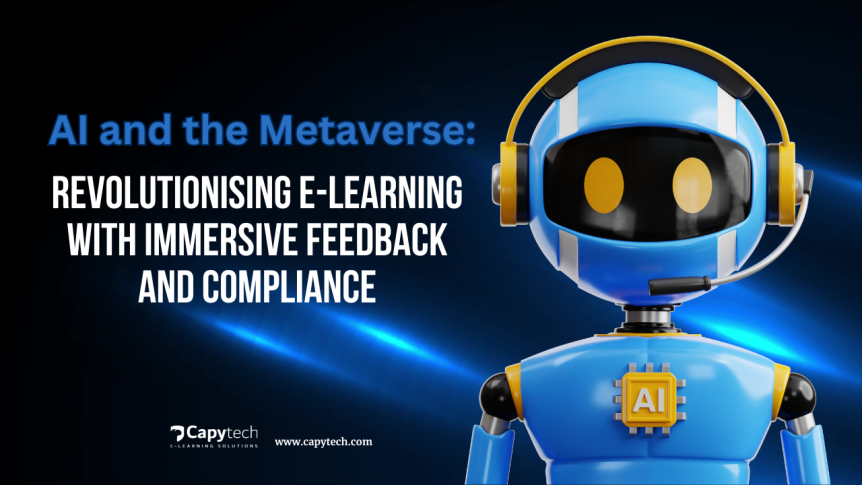AI and the Metaverse: Revolutionising E-Learning with Immersive Feedback and Compliance
The integration of Artificial Intelligence (AI) and the Metaverse into the realm of e-learning is not just a fleeting trend but a seismic shift that’s set to redefine educational paradigms. As we delve deeper into this digital transformation, it becomes evident that these technologies are not merely augmenting traditional learning methodologies but are creating a new frontier for immersive learning experiences. This blog post explores how AI and the Metaverse are revolutionising e-learning, particularly focusing on enhancing engagement, providing immersive feedback, and ensuring compliance in safety training.
Enhancing E-Learning Engagement through AI
The role of AI in improving engagement and retention in e-learning cannot be overstated. AI-driven platforms have the capability to personalise learning experiences, adapting to the individual learner’s pace, preferences, and performance. This personalisation ensures that learners are not just passive recipients of information but are actively engaged with the content, leading to better retention and understanding.
Moreover, AI’s impact on student engagement extends to its ability to generate dynamic feedback and assessments. Traditional e-learning systems often rely on static quizzes and feedback mechanisms that do not adapt to the learner’s progress. In contrast, AI-driven systems can provide real-time feedback, assess learner performance continuously, and adjust the difficulty level of subsequent modules accordingly. This not only keeps learners engaged but also ensures that the learning process is aligned with their evolving needs.
The Metaverse: A New Frontier for Immersive Learning
While AI focuses on personalising and adapting the e-learning experience, the Metaverse offers an immersive, three-dimensional space for learners to explore and interact with. The Metaverse, a collective virtual shared space created by the convergence of virtually enhanced physical reality and physically persistent virtual spaces, provides a platform for creating highly interactive and engaging learning environments.
In the context of safety training, the Metaverse can simulate real-world scenarios and environments without the associated risks. Learners can experience hazardous situations, practice emergency responses, and learn safety protocols in a controlled, yet realistic, virtual environment. This level of immersion is unmatched by traditional e-learning platforms and significantly improves learning outcomes by allowing learners to apply theoretical knowledge in practical scenarios.
AI-Driven Feedback and Compliance in Safety Training
The integration of AI into e-learning platforms has significantly enhanced workplace compliance and safety training. AI-driven feedback mechanisms can assess learners’ understanding of safety protocols, identify knowledge gaps, and provide targeted feedback to address these gaps. This ensures that all learners reach the required level of understanding and compliance with safety regulations.
Furthermore, AI can analyse data from e-learning modules to improve the training programs themselves. By identifying which parts of a course are most effective and which areas need improvement, AI helps create more efficient and effective training programs. This continuous improvement cycle ensures that safety training remains up-to-date, relevant, and in compliance with evolving regulations and standards.
Conclusion
The integration of AI and the Metaverse into e-learning is transforming the landscape of educational technology, particularly in the realms of engagement, immersive feedback, and compliance. As we continue to explore the potential of these technologies, it’s clear that they offer unprecedented opportunities for creating more effective, engaging, and personalised learning experiences. The future of e-learning is not just digital; it’s immersive, interactive, and intelligent, paving the way for a new era of digital education.
As we embrace this digital transformation, it’s essential to recognise the role of innovative technologies in shaping the future of education. The possibilities are limitless, and the journey has just begun. The integration of AI and the Metaverse into e-learning represents a significant leap forward, promising a future where learning is not just a process but an adventure.
